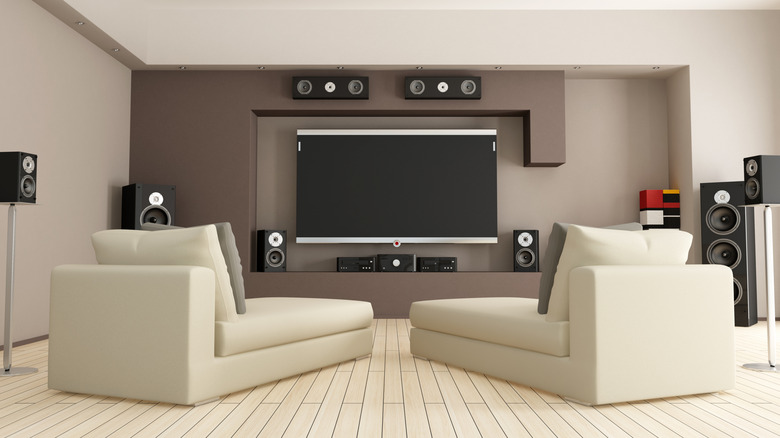What Does HTPC Stand For & Is It Really Worth Buying One Today?
The computer age has brought with it technological advancements almost too numerous to count. And yes, many of those advancements have been tagged with acronyms that don't exactly convey what the heck they actually are. Perhaps the best known letter designation is USB, which stands for Universal Serial Bus. Other acronyms of note include HTML (Hyper Text Markup Language), PDF (Portable Document Format), GIF (Graphics Interchange Format), and, PC. That last one stands for Personal Computer, though you might've seen it used in the context of HTPC.
Yes, in that four letter designation, PC still stands in for Personal Computer. But with the HT in front, it signifies a device different from the typical desktop models the PC label has long-been identified with. Rather, the HTPC acronym is applied to a piece of audiovisual tech specifically designed to bolster your entertainment game, as it stands for Home Theater Personal Computer.
If you're wondering what the purpose of such a computer is, HTPCs are outfitted with entertainment-specific features. Among them, you'll typically find things like progressive DVD playback, DVR capabilities, HDTV support, enhanced audio and video, and extra media storage — all of which function at a higher level than they might on a typical PC as they run unencumbered by other programs and potential power and storage shortcomings. The devices are also designed to be significantly smaller than desktop or laptop PCs, so users can easily hide them away, thus helping you avoid one of the more common home theater setup mistakes.
HTPCs are still useful in certain scenarios
If you read that description of HTPCs, you were likely quick to note that they sound distinctly similar to the sort of Apple TV boxes and Roku devices that are currently connected to televisions and streaming high definition movies, shows, and video games into living rooms the world over. Heck, these days TVs have gotten so smart that you don't really even need those boxes to stream and store digital content. Given those facts, you'd be correct in assuming that HTPCs aren't quite as en vogue as they were ahead of the streaming boom. Some might even argue that HTPCs are pointless in the current landscape.
That way of thinking is not without its logic, as streaming tech has sort of made HTPCs redundant in the grand scheme of most home theater setups. But the devices can still offer a little extra "oomph" to your home theater game, as they can still bolster various playback features from streaming platforms, particularly in the audio and video arenas.
On top of that, HTPCs can be particularly useful for gamers, as the devices can be outfitted to function as a dedicated gaming platform. For some less hardcore gamers, this may be preferable to investing in a dedicated gaming PC and all of its necessary components, even as a HTPC may not offer quite as much processing gusto. HTPCs can also be programmed as a central hub and control station for your smart home devices, making them a suitably versatile addition to any modern household.

